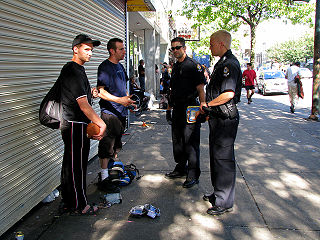Related Research Articles

Theft is the act of taking another person's property or services without that person's permission or consent with the intent to deprive the rightful owner of it. The word theft is also used as a synonym or informal shorthand term for some crimes against property, such as larceny, robbery, embezzlement, extortion, blackmail, or receiving stolen property. In some jurisdictions, theft is considered to be synonymous with larceny, while in others, theft is defined more narrowly. Someone who carries out an act of theft may be described as a "thief".
In criminal law, property is obtained by false pretenses when the acquisition results from the intentional misrepresentation of a past or existing fact.

The Theft Act 1968 is an Act of the Parliament of the United Kingdom. It creates a number of offences against property in England and Wales. On 15 January 2007 the Fraud Act 2006 came into force, redefining most of the offences of deception.

The Theft Act 1978 is an Act of the Parliament of the United Kingdom. It supplemented the earlier deception offences contained in sections 15 and 16 of the Theft Act 1968 by reforming some aspects of those offences and adding new provisions. See also the Fraud Act 2006.
"Deception" was a legal term of art used in the definition of statutory offences in England and Wales and Northern Ireland. It is a legal term of art in the Republic of Ireland.
False accounting is a legal term for a type of fraud, considered a statutory offence in England and Wales, Northern Ireland and the Republic of Ireland.

The Malicious Damage Act 1861 is an Act of the Parliament of the United Kingdom of Great Britain and Ireland. It consolidated provisions related to malicious damage from a number of earlier statutes into a single Act. For the most part these provisions were, according to the draftsman of the Act, incorporated with little or no variation in their phraseology. It is one of a group of Acts sometimes referred to as the Criminal Law Consolidation Acts 1861. It was passed with the object of simplifying the law. It is essentially a revised version of an earlier consolidation Act, the Malicious Injuries to Property Act 1827, incorporating subsequent statutes.

The Official Secrets Act 1989 is an Act of the Parliament of the United Kingdom that repeals and replaces section 2 of the Official Secrets Act 1911, thereby removing the public interest defence created by that section.

Possession of stolen goods is a crime in which an individual has bought, been given, or acquired stolen goods.
Conspiracy to defraud is an offence under the common law of England and Wales and Northern Ireland.

The Fraud Act 2006 is an Act of the Parliament of the United Kingdom which affects England and Wales and Northern Ireland. It was given royal assent on 8 November 2006, and came into effect on 15 January 2007.
Making off without payment is a statutory offence in England and Wales, Northern Ireland, Republic of Ireland and Hong Kong. It was first introduced on the recommendation of the Criminal Law Revision Committee and is intended to protect legitimate business concerns and applies where goods are supplied or a service is performed on the basis that payment will be made there and then. A taxi passenger who runs off without paying the fare at the end of the journey; and a motorist who fills up with petrol at a garage and drives off when the attendant is distracted. For these purposes, it must be proved that the defendant knew that payment on the spot was required or expected, and made off dishonestly with intent to avoid payment of the amount due.
Obtaining pecuniary advantage by deception was formerly a statutory offence in England and Wales and Northern Ireland. It was replaced with the more general offence of fraud by the Fraud Act 2006. The offence still subsists in certain other common law jurisdictions which have copied the English criminal model.
Obtaining property by deception was formerly a statutory offence in England and Wales and Northern Ireland.
Burglary is a statutory offence in England and Wales.
Abstracting electricity is a statutory offence of dishonestly using, wasting, or diverting electricity, covered by different legislation in England and Wales, Northern Ireland and the Republic of Ireland. The law applies, for instance, in cases of bypassing an electricity meter, reconnecting a disconnected meter, or unlawfully obtaining a free telephone call. In Low v Blease [1975] Crim LR 513 it was held that electricity could not be stolen as it is not property within the meaning of section 4 of the Theft Act 1968. In one reported case in 2015 a man was arrested for abstracting electricity by charging his mobile telephone on a train, but was ultimately not charged. Before the Computer Misuse Act 1990 those who misused computers ("hackers") were charged with abstracting electricity, as no other law applied.
Removing article from place open to the public is a statutory offence in England and Wales and Northern Ireland.
Obtaining a money transfer by deception was formerly a statutory offence in England and Wales and Northern Ireland.
Evasion of liability by deception was formerly a statutory offence in England and Wales and Northern Ireland.
Assault with intent to resist arrest is a statutory offence of aggravated assault in England and Wales and Northern Ireland and the Republic of Ireland.
References
- ↑ The Fraud Act 2006 (Commencement) Order 2006 (S.I. 2006/3200 (C.112)), article 2
- ↑ The Theft (Northern Ireland) Order 1978 (S.I. 1978/1407 (N.I. 23)), article 6(2)(a)
- ↑ The Theft (Northern Ireland) Order 1978 (S.I. 1978/1407 (N.I. 23)), article 6(3)